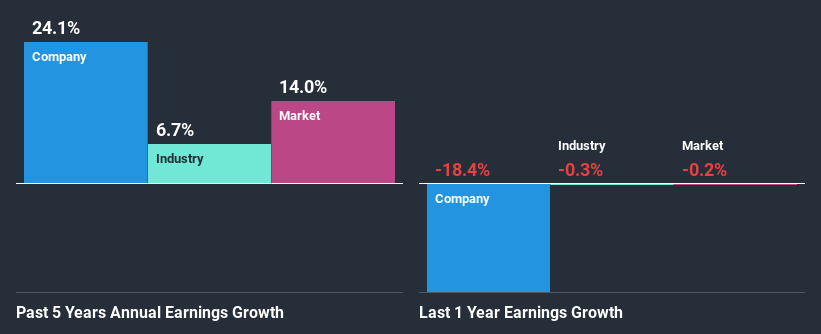- Australia
- /
- Retail Distributors
- /
- ASX:BAP
Is Bapcor Limited's (ASX:BAP) Recent Stock Performance Influenced By Its Fundamentals In Any Way?

Bapcor (ASX:BAP) has had a great run on the share market with its stock up by a significant 24% over the last three months. As most would know, fundamentals are what usually guide market price movements over the long-term, so we decided to look at the company's key financial indicators today to determine if they have any role to play in the recent price movement. In this article, we decided to focus on Bapcor's ROE.
Return on Equity or ROE is a test of how effectively a company is growing its value and managing investors’ money. In simpler terms, it measures the profitability of a company in relation to shareholder's equity.
View our latest analysis for Bapcor
How Is ROE Calculated?
The formula for return on equity is:
Return on Equity = Net Profit (from continuing operations) ÷ Shareholders' Equity
So, based on the above formula, the ROE for Bapcor is:
8.0% = AU$79m ÷ AU$982m (Based on the trailing twelve months to June 2020).
The 'return' is the income the business earned over the last year. Another way to think of that is that for every A$1 worth of equity, the company was able to earn A$0.08 in profit.
What Is The Relationship Between ROE And Earnings Growth?
Thus far, we have learned that ROE measures how efficiently a company is generating its profits. Based on how much of its profits the company chooses to reinvest or "retain", we are then able to evaluate a company's future ability to generate profits. Assuming all else is equal, companies that have both a higher return on equity and higher profit retention are usually the ones that have a higher growth rate when compared to companies that don't have the same features.
Bapcor's Earnings Growth And 8.0% ROE
When you first look at it, Bapcor's ROE doesn't look that attractive. However, the fact that the company's ROE is higher than the average industry ROE of 6.5%, is definitely interesting. Even more so after seeing Bapcor's exceptional 24% net income growth over the past five years. Bear in mind, the company does have a moderately low ROE. It is just that the industry ROE is lower. Hence, there might be some other aspects that are causing earnings to grow. For example, it is possible that the broader industry is going through a high growth phase, or that the company has a low payout ratio.
Next, on comparing with the industry net income growth, we found that Bapcor's growth is quite high when compared to the industry average growth of 17% in the same period, which is great to see.

Earnings growth is an important metric to consider when valuing a stock. The investor should try to establish if the expected growth or decline in earnings, whichever the case may be, is priced in. Doing so will help them establish if the stock's future looks promising or ominous. One good indicator of expected earnings growth is the P/E ratio which determines the price the market is willing to pay for a stock based on its earnings prospects. So, you may want to check if Bapcor is trading on a high P/E or a low P/E, relative to its industry.
Is Bapcor Using Its Retained Earnings Effectively?
Bapcor's significant three-year median payout ratio of 51% (where it is retaining only 49% of its income) suggests that the company has been able to achieve a high growth in earnings despite returning most of its income to shareholders.
Besides, Bapcor has been paying dividends over a period of six years. This shows that the company is committed to sharing profits with its shareholders. Our latest analyst data shows that the future payout ratio of the company over the next three years is expected to be approximately 54%. Regardless, the future ROE for Bapcor is predicted to rise to 12% despite there being not much change expected in its payout ratio.
Conclusion
In total, it does look like Bapcor has some positive aspects to its business. Namely, its significant earnings growth, to which its moderate rate of return likely contributed. While the company is paying out most of its earnings as dividends, it has been able to grow its earnings in spite of it, so that's probably a good sign. With that said, the latest industry analyst forecasts reveal that the company's earnings growth is expected to slow down. To know more about the company's future earnings growth forecasts take a look at this free report on analyst forecasts for the company to find out more.
If you’re looking to trade Bapcor, open an account with the lowest-cost* platform trusted by professionals, Interactive Brokers. Their clients from over 200 countries and territories trade stocks, options, futures, forex, bonds and funds worldwide from a single integrated account. Promoted
Valuation is complex, but we're here to simplify it.
Discover if Bapcor might be undervalued or overvalued with our detailed analysis, featuring fair value estimates, potential risks, dividends, insider trades, and its financial condition.
Access Free AnalysisThis article by Simply Wall St is general in nature. It does not constitute a recommendation to buy or sell any stock, and does not take account of your objectives, or your financial situation. We aim to bring you long-term focused analysis driven by fundamental data. Note that our analysis may not factor in the latest price-sensitive company announcements or qualitative material. Simply Wall St has no position in any stocks mentioned.
*Interactive Brokers Rated Lowest Cost Broker by StockBrokers.com Annual Online Review 2020
Have feedback on this article? Concerned about the content? Get in touch with us directly. Alternatively, email editorial-team@simplywallst.com.
About ASX:BAP
Bapcor
Engages in the sale and distribution of vehicle parts, accessories, automotive equipment, and services and solutions in Australia, New Zealand, and Thailand.
Flawless balance sheet and good value.
Similar Companies
Market Insights
Community Narratives





